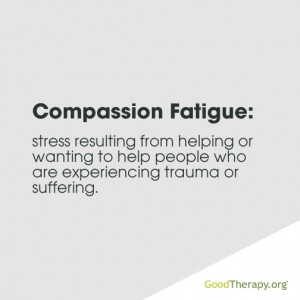Compassion Fatigue
 Compassion fatigue, also known as second-hand shock and secondary stress reaction, describes a type of stress that results from helping or wanting to help those who are traumatized or under significant emotional duress.
Compassion fatigue, also known as second-hand shock and secondary stress reaction, describes a type of stress that results from helping or wanting to help those who are traumatized or under significant emotional duress.
Understanding Compassion Fatigue
Although compassion fatigue is sometimes called burnout, it is a slightly different concept. Unlike burnout, compassion fatigue is highly treatable and may be less predictable. The onset of compassion fatigue can be sudden, whereas burnout usually emerges over time. Additionally, severe cases of burnout sometimes require the person experiencing it to change jobs or occupations, but often measures can be taken to prevent or treat compassion fatigue before a change in work environment is required.
Compassion fatigue can be a precursor or a symptom of other stressors. Because therapists are trained to utilize compassion and empathy in order for therapy to be effective, they are particularly vulnerable to emotional stress and compassion fatigue. For therapists, compassion fatigue can have ethical and legal implications if left untreated, especially if they are providing therapeutic services that are not benefiting those under their care in therapy.
What Are Some of the Symptoms of Compassion Fatigue?
Compassion fatigue can take a physical, mental, spiritual, and emotional toll on people who experience it. Common symptoms of compassion fatigue include:
- Chronic physical and emotional exhaustion
- Depersonalization
- Feelings of inequity toward the therapeutic or caregiver relationship
- Irritability
- Feelings of self-contempt
- Difficulty sleeping
- Weight loss
- Headaches
- Poor job satisfaction
Who Is at Risk for Developing Compassion Fatigue?
 Compassion fatigue can affect a wide range of professions and caregivers. It tends to be common among professionals who regularly work in a helping or healing capacity.
Compassion fatigue can affect a wide range of professions and caregivers. It tends to be common among professionals who regularly work in a helping or healing capacity.
Therapists, for example, may experience compassion fatigue when the stories and experiences of the people they meet in therapy start to affect their lives outside of work.
Nurses, because empathy and compassion are demanded of them on a daily basis, may experience compassion fatigue when dealing with heavy workloads, excessive demands of patients, and long hours.
The American Bar Association says that even lawyers, especially those practicing in areas that may require them to visit accident scenes, view graphic evidence, or deal with reports of trauma, have a high susceptibility to compassion fatigue.
Several factors can put therapists at higher risk for developing compassion fatigue:
- Specializing in therapy that introduces them to extreme issues nearly every session.
- Being physically threatened by a person under their therapeutic care.
- A person under their care dying by suicide.
- Providing therapeutic services to someone considered dangerous.
- Working exclusively with people who experience depression and/or child abuse.
- Specializing in treating death, grief, and bereavement.
- Providing therapy for someone who has experienced the death of a child or who has a dying child.
How Can Compassion Fatigue Be Prevented?
Practicing self-awareness and self-monitoring to recognize changes in behavior, work, and life outside of work is the first step to preventing compassion fatigue. Developing either informal or formal supervisory and mentor relationships within your work environment can also help you spot when you are being affected by compassion fatigue. These practices can also help prevent compassion fatigue:
- Reducing stressful workloads
- Monitoring sleep patterns
- Taking regular vacations
- Meditation
- Journaling
- Seeking personal therapy to process work problems
- Regular exercise
How Is Compassion Fatigue Treated?
It can be easy for therapists and caregivers to enter a cycle of blaming themselves for not having what it takes to do their jobs when the symptoms of compassion fatigue arise. Instead of entering a cycle of self-doubt, it can be helpful to focus your energies on:
 Talking about feelings with a trusted person and/or a mental health professional.
Talking about feelings with a trusted person and/or a mental health professional.- Learning more about compassion fatigue and how it affects people.
- Making a commitment to regularly exercise.
- Developing a healthy diet.
- Getting restful sleep.
- Developing hobbies different from work.
- Developing positive coping strategies.
- Reaching out to support groups and networks.
Often, people experiencing compassion fatigue will seek the professional support of a mental health clinician to help them overcome difficult thoughts and emotions and focus on healthy coping mechanisms.
References:
- American Bar Association. (2014, July 14). Compassion Fatigue. Retrieved July 30, 2014, from http://www.americanbar.org/groups/lawyer_assistance/resources/compassion_fatigue.html
- Lombardo, B., Eyre, C., (2011). Compassion Fatigue: A Nurse’s Primer. OJIN: The Online Journal of Issues in Nursing Vol. 16, No. 1, Manuscript 3.
- Negash, S., & Sahin, S. (2011). COMPASSION FATIGUE IN MARRIAGE AND FAMILY THERAPY: IMPLICATIONS FOR THERAPISTS AND CLIENTS. Journal of Marital and Family Therapy, 37(1), 1-13. Retrieved from http://search.proquest.com/docview/846784972?accountid=1229
- Pfifferling, J., & Gilley, K. Overcoming Compassion Fatigue. Family Practice Management, 7(4), 39-44.
Last Updated: 02-10-2020
- 24 comments
- Leave a Comment
Donna S
December 5th, 2016 at 2:05 PMI really enjoyed reading your article. It was interesting and easily understood. I am requesting that our agency, Alabama Department of Human Resources, Office of Child Welfare Training , be allowed to use this information as part of our session on Compassion Fatigue, Trauma Exposure Response and Burnout. This information would be shared with new child welfare workers in the training room. Thanks for your consideration.
The GoodTherapy.org Team
December 6th, 2016 at 11:13 AMHi Donna,
Thank you for your interest! Please refer to the email we sent in response to your inquiry.Kind regards,
The Editorial Team
GoodTherapy.orgLorna T
February 9th, 2020 at 7:08 AMThe article is useful. The term ‘committed suicide,’ is not. It is outdated and reflects value and laws that have long passed. These include the belief that suicide is a sin ( religious) or a crime ( legal.). A person who is suicidal is often committed to life but cannot find the resources to realize that desire. Please edit the article and use the term ‘died by suicide’ Thankyou ( written by a mom who lost her son to suicide)
Leave a Comment
By commenting you acknowledge acceptance of GoodTherapy.org's Terms and Conditions of Use.




